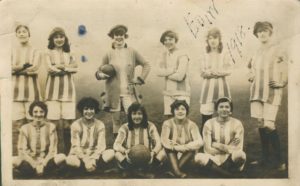England’s Lionesses in the Women’s Euros 2022: How far women’s football has come!
How proud would these pioneers of women’s football from 1918 be to see England’s Lionesses perform in the Women’s Euros 2022?!
 When this Scottish women’s team played in 2018, they would have rightly believed they had already come far. Despite attempts to set up and build up women’s football in the nineteenth century, it was World War One that gave women’s footballers the push they needed. Up until then, too many people still believed that football was still very much a man’s game and women playing it was viewed as unseemly.
When this Scottish women’s team played in 2018, they would have rightly believed they had already come far. Despite attempts to set up and build up women’s football in the nineteenth century, it was World War One that gave women’s footballers the push they needed. Up until then, too many people still believed that football was still very much a man’s game and women playing it was viewed as unseemly.
In World War One, however, many women worked together in factories for the first time. They were encouraged to keep fit for work. So they banded together to form football teams and fill the football stadiums that the men had left behind them as they went off to fight. By 1920 a Boxing Day football match between England’s top female teams, Dick, Kerr Ladies v St Helen’s, filled Everton’s Goodison Park stadium with 10,000 turned away at the gates.
But women’s football became a victim of its own success. Feeling threatened, possibly, by the success of women’s football and what effect that might have on men’s football after World War One, the FA issued a ban on 5th December 2021. No member club could let women’s teams play on their grounds. They claimed that women’s teams had siphoned off money they raised for charity for their expenses. They encouraged some doctors’ views that playing football might be bad for a woman’s body and might even stop a woman becoming pregnant.
The FA stuck to its edict. In 1947 the Kent County FA suspended a referee because he also trained a women’s football team. It was only in 1971 that the FA finally lifted their ban against women’s football. How we’d love to go back and tell all those women footballers, who persevered despite all obstacles, that in 2022 the BBC delayed the News at 10 so that we could all watch the end to another thrilling Lionesses’ game (depending on how far back we went, we might have a struggle explaining the BBC’s News at 10 first!).

 When this Scottish women’s team played in 2018, they would have rightly believed they had already come far. Despite attempts to set up and build up women’s football in the nineteenth century, it was World War One that gave women’s footballers the push they needed. Up until then, too many people still believed that football was still very much a man’s game and women playing it was viewed as unseemly.
When this Scottish women’s team played in 2018, they would have rightly believed they had already come far. Despite attempts to set up and build up women’s football in the nineteenth century, it was World War One that gave women’s footballers the push they needed. Up until then, too many people still believed that football was still very much a man’s game and women playing it was viewed as unseemly.